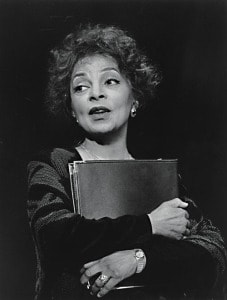 I believe that human beings are like members of a cosmic orchestra. Each of us has a vibration and a sound. Each of us is a different instrument, and as an actor, what I’m supposed to do is to hear the sounds and the silences and find the rhythms of the people. —Ruby Dee
I believe that human beings are like members of a cosmic orchestra. Each of us has a vibration and a sound. Each of us is a different instrument, and as an actor, what I’m supposed to do is to hear the sounds and the silences and find the rhythms of the people. —Ruby Dee
On a late summer evening, two days after legendary actress Ruby Dee died at the age of 91, the lights of Broadway dimmed in tribute. I’d met her as a young playwright in the early ’90s, performed with her once (shortly after her husband, Ossie Davis, died), and, only two years ago, dined with her in the company of Sonia Sanchez, Alice Walker and Gloria Steinem at the 75th anniversary of the publication of Zora Neale Hurston’s Their Eyes Were Watching God. Every time I came in contact with Ruby Dee, she left me some profound piece of herself that would help me continue my journey as an artist and a human being. Learning of her death, I felt a huge, gaping absence in the world and wondered if it could ever be filled. I found myself looking for ways to contextualize her personal and historical contribution to not only my own life but also the lives of generations.
In a career that spanned more than 70 years, Ruby Dee illuminated the aura of the textual interplay between race and poetic influence, frequently placing herself in the center of a matrix of meaning and shared ideas.
Beginning in 1943, at a time when few black actresses could find work as anything besides walk-on domestics, she began her professional career on Broadway with a lead role in the Lee Strasberg-–directed play South Pacific (unrelated to the musical), starring actor Canada Lee, and over the ensuing decades sustained a stellar career as an actor, playwright, poet and screenwriter. With her husband, she also helped democratize America, shaping a progressive outlook on race relations and social justice.
During the Cold War era, when many artists were reluctant to risk their career ambitions by publicly involving themselves with political insurgency, Dee mined the intersection between art and activism. She founded the Association of Artists for Freedom, rallied to secure clemency for Ethel and Julius Rosenberg, and was an outspoken supporter of actors Paul Robeson and Canada Lee (both under scrutiny by the House Committee on Un-American Activities). Her political views would not come without their price. Targeted by newspaper columnist Ed Sullivan as a possible Communist sympathizer, Dee (along with her husband) was eventually summoned before HUAC, and Dee was in due course blacklisted.
Her acting career abruptly halted, and, unable to work for several years, Dee and Davis scrimped out a living reading from black literature at churches, schools and union halls. They spent the remainder of the 1950s and beyond challenging the national imagery of African-American representation in both public and poetic space, as well as battling the political contradictions of democracy. As active members of the Congress of Racial Equality (CORE), the NAACP, the Student Nonviolent Coordinating Committee and the Southern Christian Leadership Conference, they never retreated from the public eye.
Responding to the highs and lows of Dee’s career, visual artist Carrie Mae Weems mused, “It takes enormous courage to tell the truth, and to find a way to tell it, without knowing how it will go or where it will land.”
Dee returned to Broadway with resounding success in 1959, winning acclaim as Ruth Younger, the quiet, supportive wife in Lorraine Hansberry’s groundbreaking family drama A Raisin in the Sun, a role she recreated in the 1961 film, for which she earned a National Board of Review award for best supporting actress. That same year, Dee co-starred Off Broadway in Ossie Davis’s race relations satire Purlie Victorious (eventually reprising her role in the film adaptation as well), and offered an emotionally layered performance in the film adaptation of Jean Genet’s metatheatrical dream play The Balcony.
Dr. Indira Etwaroo, producer of the public radio celebration of Their Eyes Were Watching God, recalls, “Her voice was distinctly hers: velvety smooth, like an expensive cognac, and deeply round, with a whimsy that was often framed by a throaty, hearty laugh. This voice bellowed out of and belied her petite frame, somehow shaping spaces and times beyond the moment to tell the story.”
Dee continued to use her voice to articulate radical resistance against hegemonic powers, befriending both Martin Luther King Jr. and Malcolm X. She emceed King’s March on Washington for Jobs and Freedoms, protested the Vietnam War, and (after assassination of Malcolm X) raised funds to buy a home and pay for the educational expenses of the Shabazz family.
Thinking of Ruby Dee’s voice, her legacy, her artistry, thinking again about the enormity of the gaping hole left in the universe by her passing, I encountered a sign posted to a brick wall. It was a quote by Rina Swentzell: “What we are told as children is that people, when they walk on the land, leave their breath wherever they go. So wherever we walk, that particular spot on the earth never forgets us, and when we go back to these places, we know the people who have lived there are in some way still there, and that we can actually partake of their breath and their spirit.”
Yes, she is still here, and she is everybody’s Ruby.
Carl Hancock Rux is a playwright and educator based in New York City.




